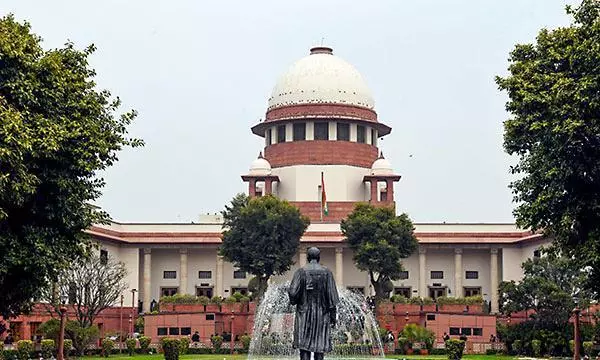
The Supreme Court on November 13 heard three petitions seeking an independent probe into the June 12 crash of Air India flight AI171.
Air India pilot not to blame for Ahmedabad crash, says SC; issues notice to Centre
Supreme Court issues notice to Centre and DGCA on plea by Captain Sumeet Sabharwal's father for independent probe' plea says foreign media blames pilot

The Supreme Court on Friday (November 7) made it categorically clear that nobody can blame the pilot-in-command for the Air India crash that happened in Ahmedabad, which killed 241 people. Captain Sumeet Sabharwal was commanding the ill-fated Air India Boeing 787 Dreamliner on June 12 that crashed shortly after take-off from Ahmedabad.
The oral observation was made by a two-judge bench of the top court during the hearing of a petition submitted by 91-year-old Pushkar Raj Sabharwal, the father of Commander Sumeet Sabharwal, who sought an independent investigation into the case.
Pushkar, a former DGCA official said in his petition that the "sole objective of the investigation of an accident or incident shall be the prevention of accidents and incidents and not to apportion blame or liability.”
The two-judge bench of Justice Surya Kant and Justice Joymalya Bagchi also issued notice to the Centre and the Directorate General of Civil Aviation (DGCA) in relation to the petition.
During the hearing, Justice Surya Kant addressed the petitioner's concern that his late son might be unfairly blamed for the accident.
“It's extremely unfortunate, this crash, but you should not carry this burden that your son is being blamed. Nobody can blame him for anything,” said Justice Kant.
‘AAIB probe not independent’
As a former DGCA official, the petitioner Pushkaraj has said he is well aware of "systemic shortfalls in the system" and has petitioned the court for "an independent accident investigation board that can ensure professional, fair, transparent, interference free, objective and time bound probe" into the matter.
During the hearing, senior advocate Gopal Sankaranarayanan, appearing for the petitioner, argued that the ongoing investigation conducted by the Aircraft Accident Investigation Bureau (AAIB) was not independent as the team of investigators comprised of DGCA officials whose actions were themselves under scrutiny.
Also Read: Supreme Court to examine fairness of Air India crash probe
“I am the father of the Commander of the plane... I am 91 years old. This is a non-independent investigation. It should have been independent. It has taken four months,” the advocate submitted as quoted by Live Law.
Judicial supervision sought
The petitioner's advocate also urged the court to order an investigation under judicial supervision as per Rule 12 of the Aircraft (Investigation of Accidents and Incidents) Rules, according to which impartiality is mandatory in investigations of accidents.
Also Read: Air India Ahmedabad crash: Pilot’s father seeks formal probe, slams AAIB report
Justice Bagchi too added that the preliminary AAIB report does not suggest any fault of the pilot. One pilot asked whether the fuel was cut off by the other; the other said no. There's no suggestion of fault in that report,” he said.
Sankaranarayanan pointed there have been persistent safety issues globally involving Boeing aircraft and stated that the Ahmedabad crash must be viewed in a larger context.
“If you challenge the investigation, you have to challenge the statutory provisions of the Act itself,” stated Justice Bagchi.
'Nasty reporting'
The petitioner also drew the bench's attention to a Wall Street Journal report citing an unnamed Indian government source who suggested that the crash may be due to pilot’s error. The article was titled "Captain of doomed Air India flight may have cut off fuel flow to engines".
The petition said, Western media's reporting seems to be an "endeavour to pin the blame squarely on door steps of the Pilots’ even at this nascent stage of the investigative process."
"The Wall Street Journal vide its article dated 17/7/2025 has quoted certain sources to openly claimed: “A black box cockpit recording of the two pilots suggests that Captain Sumeet Sabharwal was responsible for moving the fuel switches to the “cutoff” position seconds after the London-bound Boeing 787 Dreamliner lifted off the runway in Ahmedabad, India, on June 12," the petition said.
"The above insidious crafty media narrative is only aimed at maligning and tarnishing the reputation of a highly qualified professional pilot ..where he is not even alive to plead his own case," added the petitioner.
The bench, however, made it clear that the Indian judicial process would not be influenced by foreign media reports. “We are not bothered by foreign reports. Your remedy should then be before a foreign court,” said Justice Bagchi.
Also Read: Exclusive | Did Boeing’s machine fail in Air India 171 crash? A chilling sequence of possibilities
“That is nasty reporting. No one in India believes it was the pilot's fault,” stated Justice Kant.
Notice issued
The Bench took note of the submissions and issued notice to the Union Government, observing that the case would be taken up along with another related matter on November 10; where pilot Capt Amit Singh has filed a petition with the Supreme Court asking for an independent investigation into the matter.
Lawyers representing him are Prashant Bhushan and Pranav Sachdeva.
Biased report
The pilot's father, along with the "Federation of Indian Pilots," had moved the Court seeking independent investigation of the crash by a panel of aviation experts headed by a retired Supreme Court judge.
They felt the preliminary report of AAIB was biased. The petitioner asked, why when the "AAIB which admits to have the entire last two hours of recorded cockpit pilots conversation" did not release the entire transcript of the recordings."
The petitioner has also claimed the AAIB report pilot error without factoring in critical technical and systemic factors.

